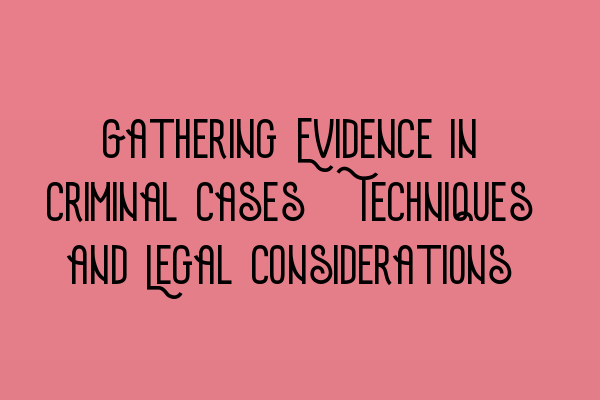Gathering Evidence in Criminal Cases: Techniques and Legal Considerations
As criminal law solicitors at SQE Criminal Law & Practice Law UK, we understand the importance of collecting strong evidence to support your case. The ability to gather compelling evidence can make a significant difference in the outcome of a criminal case. In this blog post, we will discuss various techniques for gathering evidence in criminal cases and highlight the legal considerations involved.
1. Document Review and Analysis
One of the fundamental steps in gathering evidence is conducting a thorough review and analysis of relevant documents. This includes police reports, witness statements, forensic reports, and any other documents pertaining to the case. By carefully examining these materials, solicitors can identify potential inconsistencies, gaps, or areas that require further investigation.
2. Witness Interviews
Another crucial aspect of evidence gathering is conducting interviews with witnesses. Witness statements can provide valuable insights into the events surrounding the alleged crime. During interviews, solicitors must ask relevant and thought-provoking questions to elicit accurate and detailed information. Additionally, it is important to ensure that the interviews are conducted in a manner that respects the rights and interests of the witnesses.
3. Forensic Expert Consultation
In cases where forensic evidence plays a significant role, seeking consultation from forensic experts is essential. These experts possess specialized knowledge and skills that can help interpret complex scientific findings. By working closely with forensic experts, solicitors can strengthen their understanding of the evidence and present it effectively during court proceedings.
4. Digital Evidence Collection
In today’s digital age, digital evidence can play a critical role in criminal cases. This includes information obtained from electronic devices, social media platforms, surveillance cameras, and other digital sources. Solicitors should be well-versed in the techniques of collecting, preserving, and analyzing digital evidence to ensure its admissibility in court.
5. Surveillance and Observations
Sometimes, gathering evidence requires physical surveillance and observations. This can involve monitoring suspect activities, documenting their behavior, or capturing relevant visuals. Solicitors must be mindful of any legal considerations associated with surveillance techniques, such as privacy laws, and ensure that the evidence obtained in this manner is obtained lawfully.
6. Expert Testimony
Expert testimony can greatly influence the outcome of a criminal case. Solicitors should identify and consult with appropriate experts who can provide expert opinions or explain complex subjects to the court. Expert witnesses can offer insights, interpretations, and conclusions that can strengthen the evidence in favor of their client’s case.
Legal Considerations
While gathering evidence, solicitors must always adhere to legal considerations to ensure the admissibility and ethicality of the evidence. These considerations include:
- Relevance: The evidence must be relevant to the case and help establish the facts.
- Reliability: The evidence must be reliable and obtained through lawful means.
- Admissibility: Solicitors must ensure that the evidence is admissible in court and meets the necessary legal requirements.
- Rights: The rights of the accused, witnesses, and other parties involved must be respected during the evidence-gathering process.
At SQE Criminal Law & Practice Law UK, we understand the importance of meticulous evidence gathering in criminal cases. By employing various techniques and considering the legal aspects, we strive to provide strong and compelling evidence to support our clients’ cases.
If you’re interested in further developing your legal skills, we offer numerous courses to help you in your preparation for the SQE exams. Check out our SQE 1 Practice Exam Questions and SQE 1 Practice Mocks FLK1 FLK2 for interactive practice sessions. Additionally, our SQE 2 Preparation Courses and SQE 1 Preparation Courses are designed to help you excel in your journey towards becoming a qualified solicitor. Stay updated with the latest SRA SQE Exam Dates to plan your studies effectively.
Thank you for reading our blog post on gathering evidence in criminal cases. If you require professional legal assistance, please do not hesitate to reach out to us at SQE Criminal Law & Practice Law UK.
Disclaimer
This blog post is intended for informational purposes only and does not constitute legal advice. Please consult a qualified solicitor for legal advice specific to your case.
